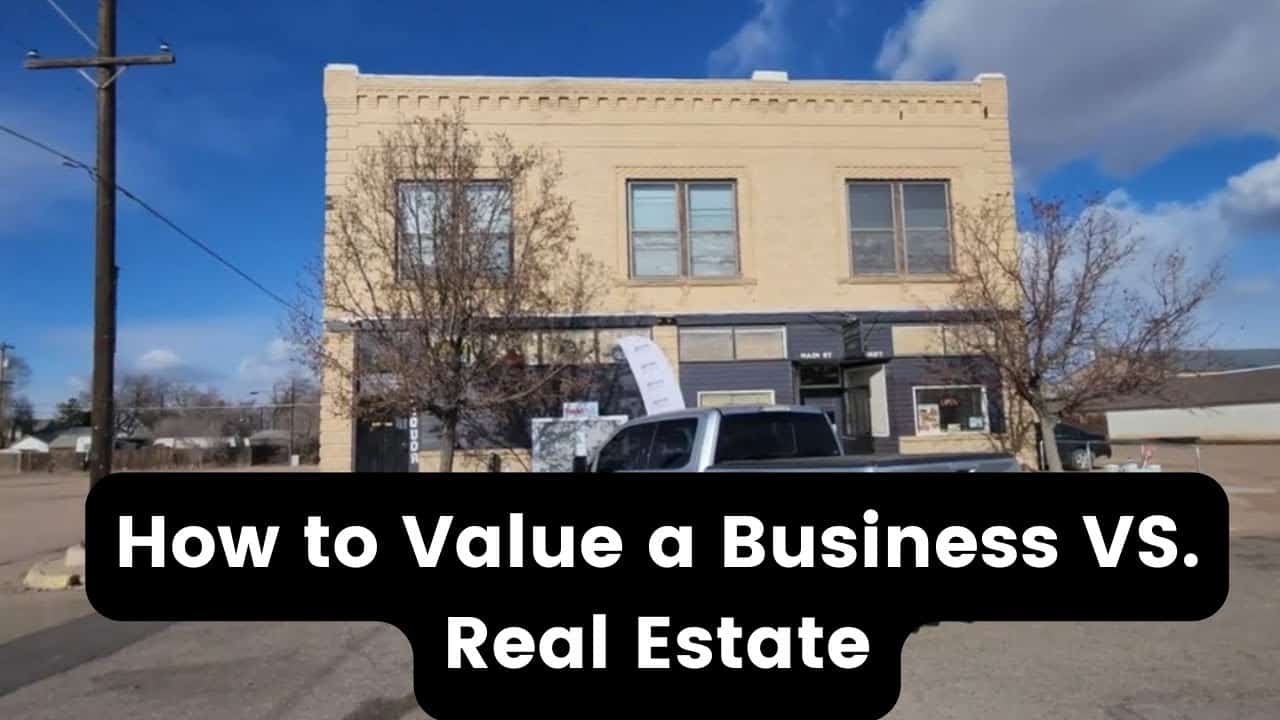
February 27, 2025 by Mark Ferguson
If you’re considering diversifying your investment portfolio beyond traditional real estate into business ownership, understanding how these assets are valued differently is crucial. As someone who owns both commercial real estate properties and operating businesses like liquor stores and laundromats, I’ve learned valuable lessons about how these assets are appraised, financed, and managed.
Video: How do You Value Businesses Differently From Real Estate?
How I Bought My First Liquor Store and Mini Mart
About three years ago, I purchased a property that included a liquor store/mini mart on the main level and three apartments upstairs. The entire package cost me $610,000, plus approximately $80,000 for inventory. Since then, I’ve also acquired another liquor store and own a couple of laundromats alongside my roughly 40 commercial, residential, and multifamily properties.
Commercial Real Estate Investing
When I made that first purchase, I immediately took a strategic step that significantly boosted the overall value: I separated the business from the real estate.
I created two distinct companies:
- One company to own the real estate (property)
- A separate company to operate the business (liquor store)
This separation allowed me to establish the business as a tenant paying rent to the property, alongside income from the upstairs apartment rentals. This structure created clear rental income streams for the real estate asset, which is exactly what lenders and future buyers want to see.
Why Businesses and Real Estate Are Valued Differently
Real Estate Valuation Basics
Real estate, particularly income-producing properties, is typically valued based on the rental income it generates. Here’s a simplified example:
If a property has a gross annual income of $100,000, in my market, that property might be valued at approximately $1,185,000.
The calculation is straightforward: $100,000 ÷ 8.5% (gross cap rate) = $1,185,000
You can also use net income (after subtracting expenses like property taxes, insurance, maintenance, and utilities), but the gross income method provides a quick, high-level valuation.
Is real estate a good business?
Business Valuation Basics
Businesses are valued completely differently. The same $100,000 in annual net income (profit) from a business might only translate to a business value of $300,000-$400,000.
Why such a difference? Risk and tangibility.
If you mismanage a property, it might sit vacant, but the physical asset—the building, land, and infrastructure—still maintains significant value. Someone can buy it and turn things around.
With a business, if you completely mismanage it and shut the doors, there might be nothing left to sell. The business could literally become worthless without the ongoing operations.
Owning a Laundromat Pros and Cons
Additional Considerations for Business Valuation
Business valuations often include additional factors:
- Inventory value (for businesses like liquor stores)
- Equipment and fixtures
- Owner’s role in generating income (if the owner works 80 hours/week, that impacts profitability)
- Accuracy of reported sales and expenses
- Industry-specific multipliers
Financing Differences: Why Banks Prefer Real Estate
This valuation gap also explains why financing differs dramatically between these asset classes:
- Real Estate: Banks love financing real estate because they can clearly see the value based on appraisals, comparable sales, and rental income. The physical asset serves as excellent collateral.
- Businesses: Banks are much more hesitant to finance businesses because the value is more nebulous and can disappear quickly under poor management.
When I recently purchased another liquor store for $910,000 (real estate) plus $100,000 (business, inventory, and equipment), my bank was happy to finance the real estate portion but wanted nothing to do with the business part. I had to pay cash for the business assets.
The Strategic Advantage of Separation
By separating the business from the real estate, I’ve created multiple exit strategies:
- Sell the business while keeping the real estate and collecting rent
- Sell the real estate to an investor while continuing to operate the business as a tenant
- Sell both together to someone who wants the entire operation
This approach maximizes potential buyers and typically results in higher overall value than selling everything as a single package (with some exceptions for businesses completely tied to their location, like car washes).
The Risk vs. Reward Equation
The valuation difference reflects the risk profile of each investment:
- Real Estate: Lower risk, stable income, higher value relative to income, tangible asset with intrinsic value
- Business: Higher risk, potentially higher cash flow, lower value relative to income, requires active management
Why I Still Love Business Ownership Despite the Risks
Despite the increased risk and complexity, I genuinely enjoy operating businesses. There’s something deeply satisfying about:
- Having an actual product and sales process
- Being able to tweak operations and see immediate results
- Marketing and increasing sales
- Creating systems for better performance
The hands-on aspect of improving a business day by day provides a different kind of fulfillment than passive real estate ownership.
Key Takeaways for Investors
If you’re considering investing in businesses alongside real estate:
- Structure matters: When possible, separate business operations from property ownership
- Understand financing realities: Be prepared to pay cash for business assets
- Valuation differences: Real estate is typically valued at 10-12× annual gross income, while businesses might be 3-4× annual net income
- Trust your judgment: Sometimes, your own assessment of what a business can produce is more valuable than the seller’s reported figures
Whether you’re focused exclusively on real estate or expanding into business ownership, understanding these fundamental differences will help you make smarter investment decisions and potentially identify opportunities where real estate and businesses are being sold together as a package deal.
Are you interested in diversifying beyond traditional real estate investments? Join me on the $100M Mission and watch my progress as I continue growing my portfolio of both real estate and business assets. Set your own asset growth goals and let’s build wealth together through strategic investments.
Have questions about valuing businesses versus real estate? Comment below or reach out directly—I’m always happy to share insights from my experiences.
Join me on The $100M Mission!
Get exclusive updates as I work to own $100M real estate by 2030 in today's market. Whether you're just starting out or already investing, you'll get actionable insights from my real-world deals and setbacks.
Plus, I'll help you set and achieve your own ambitious goals. Transform your financial future - subscribe now for weekly updates.
Together, we'll prove that massive success in real estate is still possible.



















 English (US) ·
English (US) ·